#but then how to convey you are just having fun theorizing the dramatic possibilities of unserious comedy
Explore tagged Tumblr posts
Text
One of the biggest problems of writing that Frasier post is that the logic of 90s comedies is not real life logic. It's not just that you can just pick which exaggerated thing to believe more (and sometimes you need to outright pick between two mutually excluding canon facts), but also the degree to which you believe anything. Which is fun for theorizing but also terrible for theorizing because to argue one way or another you need to create the fiction that the coherent narrative you are pointing out has value of truth in a universe where the value of truth is the rule of funny.
#This I'm saying about Frasier applies to others btw of course#like The Nanny suffers from those very same problems too#plus prestige tv in the early 2000s really messed with people's understanding of the extreme make-up-as-you-go quality of older tv#It's acknowledged with Cheers for the most part#But like yes Maris becomes more and more of a monster as seasons go by because the creators did take a direction after a few seasons#but seasons 1 and 2 at the very list (of Frasier I mean) are VERY undecided on whether they are going to save Niles and Maris' marriage#or take the Daphne route#And there's so much about expected genre tropes and the structure of sitcoms involved in those decisions!#the rule of funny being the main rule of a world above that of coherence and plausibility truly is a double edged sword#Like I'm confident I can write a narrative as to why Maris is actually not a monster at all in the first seasons of Frasier#And that at the very least some of the jokes are not meant to be taken seriously#but then to prove that I would have to point out all the times the narrative shows Niles mirroring Maris' bad traits#which of course are also ruled by the rule of funny!#Niles worrying about Maris ogling the pool boy while he's been ogling Daphne#Niles talking fondly of how one of their favorite past times when they were just married#was to laugh at people who wore white after labor day!#someone else could of course believe THESE are the ones played more for comedic effect#and believe the meanness of Maris as more real#(again still talking those early seasons)#and like it's not that serious#horrible people can be entertaining and comedy capitalizes on that#it's the emotional equivalent to the physical violence in old cartoons#it's not supposed to be realistic and taking it to be so is silly#on the other hand reimaging how the characters and the story could go in different directions#if the story WAS a drama is deeply compelling#but then how to convey you are just having fun theorizing the dramatic possibilities of unserious comedy#without coming across as if you were taking the comedy to be a drama#see the tough spot I'm in
10 notes
·
View notes
Text
RWBY Recap: “Cordially Invited”
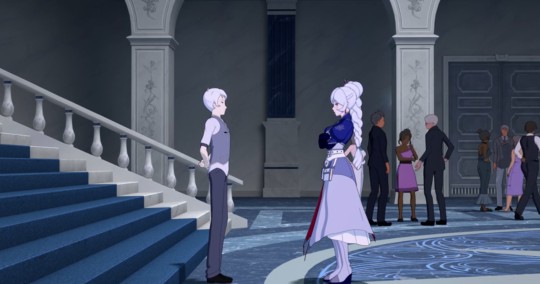
Only a week late, folks! Can’t say I’m surprised, what with the holidays underway and my normal schedule all topsy-turvy. Still, at least now there’s a little something to fill the RWBY-less hole this Saturday. Always a silver lining.
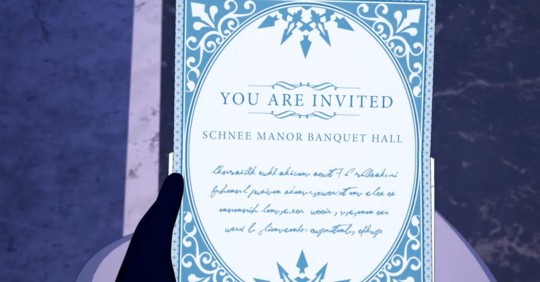
We begin the episode with our group discussing their upcoming dinner---Oscar included! We’re off to a great start. We learn that Jacques supposedly just wants to “break bread and hash things out,” but anyone with two brain cells to function together know that’s a load of BS. What frustrates me is Ruby’s attempts to spin this as a good thing because they supposedly want Ironwood to start “opening up” to “these people.” Yeah... there’s so much wrong with that. Normally Ruby’s optimism is one of the personality traits I love most about her, but lately that optimism has been twisted into naivety at best, that pro-protagonist perspective at worst. We saw this in Volume Six where the optimistic “We’ll find some way into Atlas!” became an attack on Argus. Now, Ruby’s “Maybe this won’t be so bad!” is functionally an attack on Ironwood. The responsibility lies with him to achieve that good outcome: he needs to open up to the horrendously corrupt abuser that Weiss at least suspects might be involved with Salem. Note that Ruby doesn’t extend those same expectations to herself and her team. She doesn’t claim that they all should “open up” to Jacques in the name of crafting better relations. No, she immediately jumps to having Weiss spy on him in order to get ahead in the game. For the record, I don’t give a damn if the group commits “bad” actions against Jacques (more on that below) because again, Jacques is an evil, corrupt abuser. Rather, it’s just that continuing issue of hypocrisy. Ruby expects Ironwood to “open up” to him and make peace over dinner, but only expects herself and her friends to give him what’s for. Insert [Ozpin and Ironwood must never keep secrets or tell lies, but we’re allowed to] here. Same song, different tune.
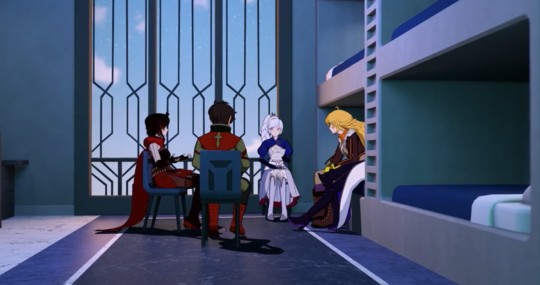
Oscar at least points out how idiotic that perspective is from a practical perspective. He doesn’t call Ruby out on the expectation that Ironwood make nice with the man they want to keep Weiss five billion feet away from, but he does acknowledge that such expectations can’t be fulfilled at this time in this place. Jacques has tailored this dinner to benefit him and him alone. He will control the conversation, so good luck getting around that.
Weiss: “I think my dad would do whatever it takes to win.”
Ruby: “And we should do the same.”
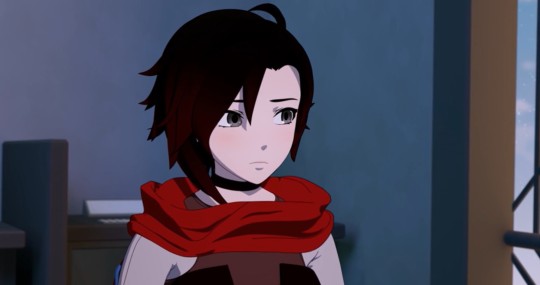
Granted, “whatever it takes” comes to mean spilling some food which obviously is in no way comparable to Jacques’ entire existence. The viewer doesn’t know that’s coming though. When we first hear them, these lines are another nod to the closing gap between the “heroes” and the “villains”---whether we’re defining a “villain” as someone like Jacques or someone like Ozpin. The theme is there. The group is willfully adopting the same choices as those they oppose. If Ozpin is going to lie to us then we’ll lie to Ironwood. If Jacques is going to do whatever it takes then so will we. Which isn’t necessarily a bad thing. As I’ve mentioned in non-recap metas, RWBY has now created a harsh world where by-the-book heroics will only hurt you in the end. If Ozpin had never kept secrets I don’t believe he would have achieved that extraordinary time of peace. If Blake and Yang hadn’t killed Adam they still would have a murderous abuser stalking them. We clearly have a story where the concept of a lesser evil exists...it’s just that we’re continually turning around to insist that the group is somehow better than everyone else for also doing what they have to to survive.
Which brings me to the fact that if Blake and Yang told everyone else about Robyn, we get not indication of that here. The only nod to last episode’s huge decision was Robyn’s shock that Jacques doesn’t already know what the Amity tower is for, but she’s cut off before she can reveal anything in front of Ironwood. So until proven otherwise... here’s another secret. Not just from an adult in a position of authority, but from the rest of the team as well. Given that Blake hid her faunus status and time in the White Fang, Yang continues to hide her knowledge of the Spring Maiden, both of them are helping to keep at least three major secrets from Ironwood, and are now keeping the Robyn secret from everyone else... no leg to stand on. Not to be dramatic on main, but if either of them ever pulls another, “How dare you keep secrets?!” I’m gonna go absolutely feral lol.
Anyway, back to the plot.
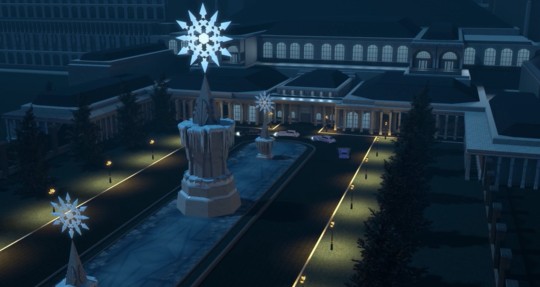
There are no new models of the group in fancy dinner clothes. I in no way had my hopes up for that, but it was fun seeing the posts theorizing about it and I can understand others’ disappointment. That definitely would have been a nice surprise, if an insane amount of work for what amounts to ten minutes of screen time.
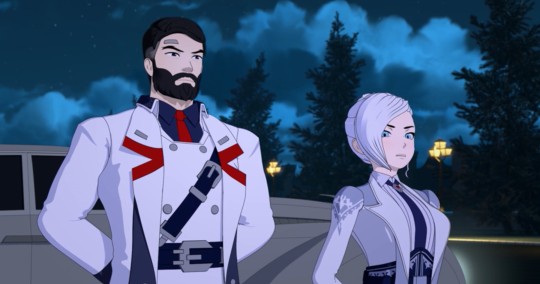
Instead everyone just shows up in their normal gear and we get a telling exchange between Ironwood and Winter where she informs him he’d have to pay her to smile. I’m really glad she got a lot of attention this episode, both because we expect as much with her returning to the Schnee manor and because, if she’s going to become the next Winter Maiden, we really need to develop her character some. Even just setting up that she might become a Maiden demands that Winter be more than just Ironwood’s second hand and Wiess’ big sis. Who is she on her own? We start getting a glimpse of that here.
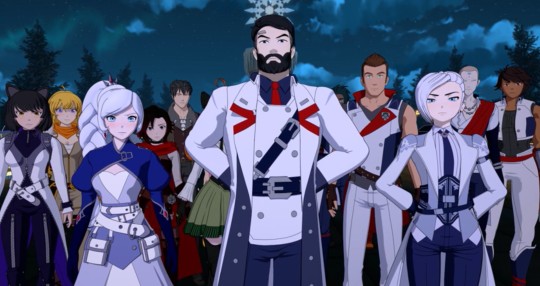
Before her outburst though, the group arrives en masse looking like a small army knocking on Jacques’ door. They’re greeted by Whitley who comments on that, asking Ironwood how large he thinks their dining room table is. Absolutely humongous, obviously. Not really the point though. This is clearly Rooster Teeth poking fun at their own massive cast, which would be more enjoyable if the number of characters didn’t constantly hinder the story. Personally, I’d prefer that they actually tackle underdeveloped or mostly dropped characters (like Maria) rather than just joking about it, but anyone keeping up with these recaps already knows that. If we’re not going to get a better structured story I’ll take some jokes here and there. Laugh about it when you can.
Although, I will say that Rooster Teeth does a good job with a minor character here, namely Klein. Whitley makes a dig at Weiss over how he was let go. Wonder how that could have happened. Klein, to my mind at least, was always meant to be a one shot sort of deal. He was introduced to help Weiss escape and once he’d achieved that was no longer useful to the story. It makes sense that we left him behind, but it’s nevertheless wonderful to get a bit of closure. Sad closure, but closure nonetheless. Now, if Rooster Teeth wants to keep him out of the picture we technically have a complete story. We know who Klein was, what he did, and what happened to him in the aftermath. Yet by keeping him alive and away from the Schnees, there’s always the potential that we’ll run into him again someday. I’m quite satisfied with that balance. It’s much better than what I was expecting, namely for Weiss to return home and conveniently not run into him because that would complicate things. Here we’re given an in-character explanation for his absence. Of course Jacques would fire him.
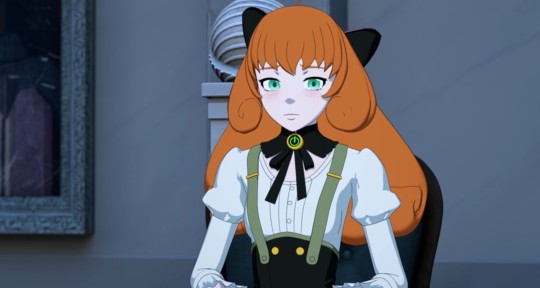
Finally, in the realm of massive casts and character development, I’ve got to admit that I’m disappointing with Penny being there. Simply because it once and for all shatters the hope that this well-executed frame job will amount to anything. If she’s attending a dinner with Jacques Schnee then things are fine. I said that I wasn’t convinced of this “Penny might be deactivated!” consequence before and I’m definitely not convinced of it now. Theoretically another consequence could have been Ironwood losing his council position, but we don’t see that either. Jacques references Ironwood’s inability to catch whoever hacked them at Beacon and his inability to catch whoever attacked Robyn’s supporters as reasons for being untrustworthy, both of which stand without the frame job. It’s incidental. Tyrian could have just killed everyone as Tyrian and it would have had the exact same effect. All the framing has done is make Penny sad (which hasn’t led to any development yet) and get Pietro to spill the beans about her aura (which could have happened in a thousand other ways). I was so pleased at this setup and the ingenuity of the villains, wondering what sort of impact this framing would have, but now we see the impact is minimal at best. If you frame a character for murder but have no other major character questioning their guilt and they’re out in public two episodes later... what was the point of the framing? Penny’s presence here is disappointing. Not because I don’t love Penny, but simply because of more missed opportunities. At this point I’m wondering why they bothered to bring her back at all. We’re not going to have Ruby grapple with the resurrection of her friend. We’re not going to deal with Penny taking the heat for Tyrian’s murders... Why is she here?
Also, not to distract from these important questions but... that.
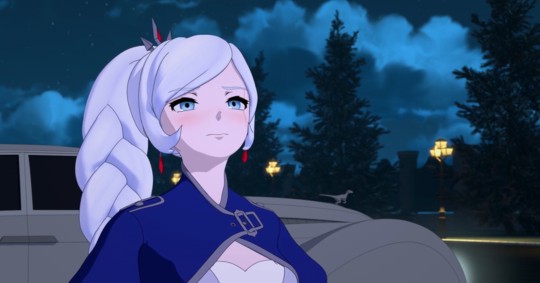
That.
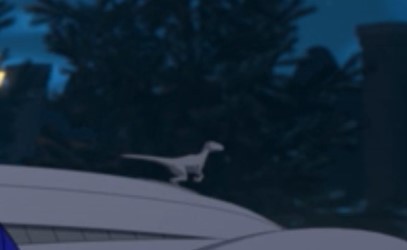
Friends, I cannot quite convey how confused I was at first. This is obviously supposed to be akin to the Jaguar ornament but... that’s a raptor, right? Have we seen raptor-type grimm? Am I missing something?? Yes, yes I am. Turns out RWBY Rex is a thing I never knew about and I can now only assume this is another Easter egg. Either that or I’m still missing something. Which is always possible. Either way it made me laugh.
The group heads inside and then splits, Ironwood, Clover, Winter, and Penny going into the dining area. Clover makes a quip about needing luck and Qrow points out that he’s already been invited. I can easily see why so many people are shipping them, but as a hardcore ozqrow shipper myself I’m already biased to view this as friendship. Maybe if we see more of Clover and he doesn’t die like everyone thinks he will I’ll find space in my heart for a dual ship. Either way it’s sweet. As much as I’d like Qrow to acknowledge the best friend he already has two feet away in the body of a kid he hasn’t treated particularly well, I’m nevertheless here for Qrow having healthy and supportive relationships.
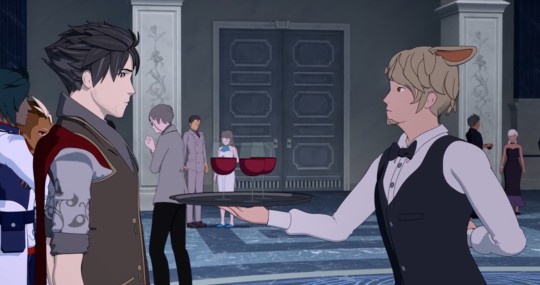
We also get to see him refusing a glass of wine. Thank you! Again, it’s pretty late in the game to introduce this and we’re still given no insight into why Qrow is willing to battle his addiction now when he’s succumbed to it for most of his life, but at least they’re maintaining the work needed to stay sober. Qrow politely refuses the offer (from a faunus waiter. No surprise there given Jacques’ racism) and removes himself from temptation by offering to patrol the grounds. Very nicely done. The other Ace Ops join him, warning the newbie huntsmen not to wander off, not to break anything, and make sure you’re available if Ironwood needs you.
To which Yang provides the counter point that they should wander off, they should break things, and all the rest. Jaune later says, “What was that about breaking things?” Admittedly, these lines originally rankled. Because as much as Jacques deserves all the snooping and breaking our team can dish out, I maintain the position that they need to act more responsibly, especially now that they’re officially on the job. We’ve already got Blake and Yang deciding to go behind their bosses’ back. We don’t need them aggravating a situation when they’re the ones who want Ironwood to do that “opening up.” Jacques controlling the situation aside, Ironwood is even less likely to make headway if his guests are off causing trouble.
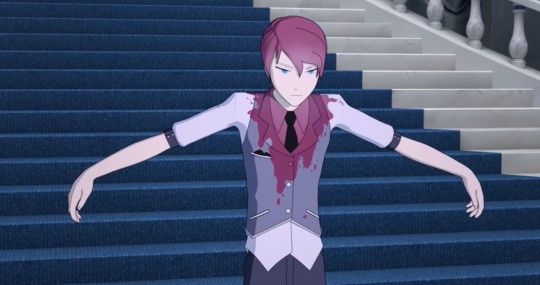
Which is why I’m so thrilled they didn’t. I’ll be blunt and say straight out that this was a fantastic way to do things. They’re allowed to get food. Nothing wrong with that. We already know Nora is a big eater and tends to be impulsive. If she just happens to pile a plate crazy high, it just happens to hit another guest, and she just happens to douse Whitley in wine? Well... who could have seen that coming? It’s a way of causing mayhem without endangering others or their mission. It achieves the one very specific thing they need: give Weiss an opening to sneak off. No one went overboard. No one else actually snuck off to break things. It was an all around smart plan. Unlike the group attacking Cordovin or Weiss dumping a racist in the trash when they’re supposed to keep a low profile, this is the kind of decision making I can get behind. Something that demonstrates the maturity the group continues to insist they have alongside keeping their playful personalities.
Also, just look at Ren’s smile. That might be the first smile we’ve gotten from him all season. That’s a blessed image, right up there with Oscar stealing hors d'oeuvres the second he walks through the door. Our farm boy is hungry and he’s going to milk Jacques’ wealth for all it’s worth.
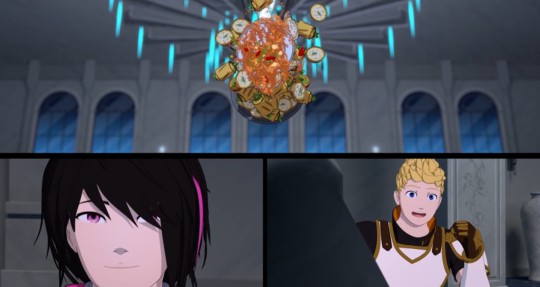
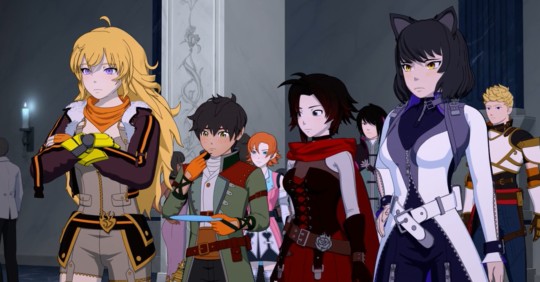
The other thing this scene gives us---besides the joyous image of Whitley drenched in wine and Weiss’ amusement over it---is the split screen technique. On the whole I think Rooster Teeth chucks this in too often. There have been many times since the beginning of Volume Six, especially during fight scenes, where the split screen doesn’t feel necessary to me and is even at times quite distracting. Here though? I think it works. The split screen montage used to show the many people involved in, say, a heist is a pretty common technique and it adds another spot of humor to this situation. They’re plotting and executing their food spill with all the sincerity of a bank robbery. I’m here for that.
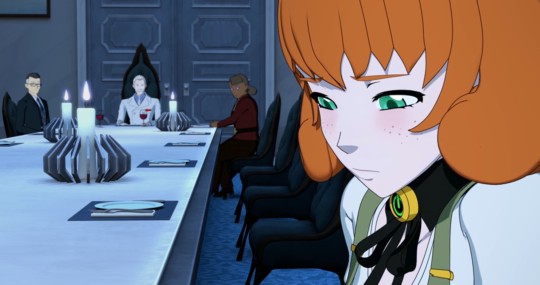
As Weiss heads upstairs we turn our attention to the meeting with Jacques. It goes about as well as anyone expects. A lot happens in that short span of time though. Robyn sarcastically points out that she should just be happy to have been “invited to the table” and though there’s another black woman across from her, it stands out to me that Robyn, a comparatively dark skinned woman to the rest of the group, says this while the shot poises her between two very white, powerful men. Even the phrase “invited to the table” has gender and racial implications for the audience watching, outside of Robyn’s in-world characterization as a Robin Hood type focused on class. Going off of these themes, we also hear Ironwood reassuring Jacques of their safety by claiming that “Penny is completely under my control.” This, hands down, is the worst thing I’ve seen Ironwood do this volume. Sure, things like the embargo and the supplies have objectively worse consequences, but the story has done a lot to demonstrate the “greater good” justifications behind those choices. We might not agree with Ironwood, but we’re supposed to understand that (until proven otherwise) he has good motivations. Here? That comment is pretty horrible. Ironwood refers to Penny as if she’s a weapon or a tool, a young woman who he believes he literally has control over. It’s a fascinating look into his perspective and a pretty logical one as well. Here’s a man who has put so much faith in his technology, from amassing an army to protect his kingdom to relying on prosthetics to get around. He asked his team to create a new security measure and they did... they just happened to create a person along with it. I’m not sure Ironwood fully understands that yet. He trusts Penny enough to bring her into his own inner circle, but he likewise thinks he can manage her like he would a gun or a vehicle, dictating whether she has friends and announcing that she is under his control. I hope that this is something the writing explores and helps Ironwood work through, rather than just letting it sit as generic evidence that he’s a bad (as opposed to flawed) person. I think Ironwood would realize his mistake and work to correct it if someone pointed out the issue, in the same way we’ve seen him considering, settling, and agreeing with the issues the group has seen fit to yell at him lately.
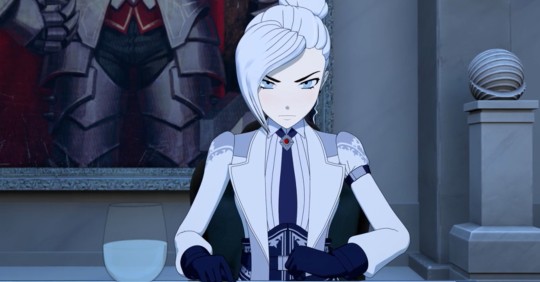
What interests me most about this whole interaction is (shocking) this continued debate regarding secrets and trust. Overall Rooster Teeth has actually succeeded in creating a decently complex situation here. We know that (again, until proven otherwise) Ironwood has only good intentions and we likewise know that Jacques is now connected to Salem. The information the audience has makes us biased. We know who is supposedly good and supposedly bad. At the same time though, the actual issue appears to be removed from that. Jacques’ side---notably expressed through a new character who acts as a more neutral party---points out that from where they stand there’s no reason for this embargo. We know there’s a reason. Ironwood knows there’s a reason. Because we all know about Salem. But the other council members are making entirely reasonable demands given the information they have: why are you continuing to hurt both the people and our relationship with others? What’s the justification? You can’t give us one? Then why in the world would we let you keep doing this? It puts us in the discomforting position of knowing Jacques is an evil slim ball manipulating the conversation while likewise having to admit that his side has a point. You can’t just announce Salem’s existence because that would make things exponentially worse, but keeping her secret has its definite downsides.
Where Jacques’ party doesn’t have a good position is in his insistence that because Ironwood hasn’t caught these various perpetrators he can’t be trusted, equating trust with results. There’s only so many ideas, resources, and luck that can lead you to catching someone like Tyrian. I understand that knee-jerk reaction, the idea that because someone hasn’t succeeded you should replace them with someone you assume will, but in situations like this you only have so much control over the probability of success. Claiming that Ironwood not catching criminals is indicative of an inability to lead is flimsy, but as we’ve seen, Jacques is a manipulator. He tosses these assertions out as if they’re facts. He and the others continually cut Ironwood off, refusing to let him defend himself. It’s not at all surprising that Winter, someone who suffered under his abuse, eventually explodes with, “You can’t just buy trust like everything else! You have to earn it.” Winter is someone I’m particularly interested in seeing react to the group’s secret keeping because from her perspective, she and Ironwood have earned the group’s trust a hundred times over. Again, provided the story isn’t hiding something from us and Winter is secretly in on some plot with Ironwood, we’re seeing this volume how she’s done the work her father couldn’t and it still wasn’t enough. Her peers, including her baby sister, still decided they weren’t going to trust her with secrets that are intimately tied up in their current work and choices.
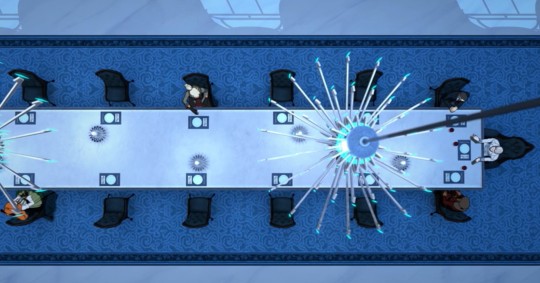
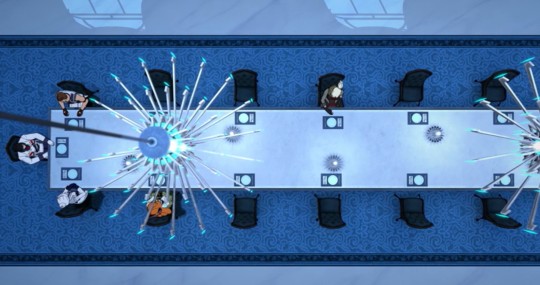
Frustrating moral questions aside, something I really loved about this scene was the character setup and the cinematography. Having Jacques with his two allies on one side, Ironwood mirroring that on the opposite end of the table, and Robyn sitting poised between the two, the audience still unsure whose side she’ll fall on. That aerial shot showing off the distance between them all? Excellent visual storytelling.
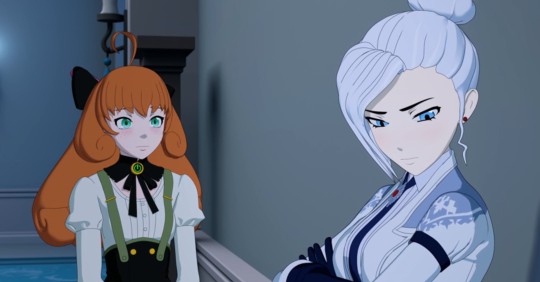
We get a quick conversation between Winter and Penny which I don’t have too much to say about. Merely that I love Penny for checking up on Winter and I love Winter for correcting her assumption: I’m not saying you wouldn’t understand because you’re a robot, I’m just saying these problems are very specific to me and being in this place. That was particularly reassuring after Ironwood’s comments. Penny ends the scene by saying she doesn’t understand why Winter wouldn’t want to follow her heart. Perhaps an odd comment coming from someone who almost blindly obeys the orders she’s given even when she doesn’t agree---such as not making more friends---but then, it may well be a ‘do as I say, not as I do’ situation. Just because Penny isn’t sure how to always follow her own heart doesn’t mean she can’t encourage others to do the same.

We return to Weiss who, after getting past a curious server, makes it to her father’s office. I feel like this is the scene people are most invested in, considering that I’ve seen a LOT of posts lately trying to demonize Willow for her comment about Whitley. Here’s what people need to remember about Willow moving forward: she’s as much a victim of abuse as Weiss is. She is, presumably, Jacques’ first victim, fully entrenched in his abuse by the time her kids started coming along. As a mother does she have a responsibility to her children? Absolutely, but that doesn’t erase the fact that she’s simultaneously a woman attempting to survive domestic abuse.
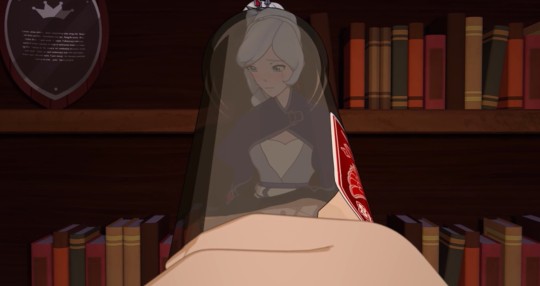
(That’s another stunning shot hell yes.)
Initially Weiss takes the side of the posts I’ve seen, painting her mother as someone who made a conscious decision to let the abuse happen---another abuser herself, one out of passiveness. “Some of us are trying to do something about it,” Weiss says, emphasizing that she’s better because she’s doing what her mother never could: fighting back. Ignoring for a moment the highly dubious insistence that abuse victims must simply ‘do something’ about that abuse (it’s not that simple at all), Weiss quickly realizes that she was wrong. Her mother has been doing something, namely setting up hidden cameras around the house for some spying of her own. Why? “For our safety.” To make sure that if Jacques ever goes farther than he already has, Willow will know about it and can take appropriate steps. Is taking precautions against something worse better than leaving a situation that’s already horrific? Of course not, but as said, abuse isn’t just something you can fix. Even if you know it’s happening. This is a woman doing all she can and what someone is capable of in an abusive relationship is based on them and that context, not what others believe is fighting back “enough.”
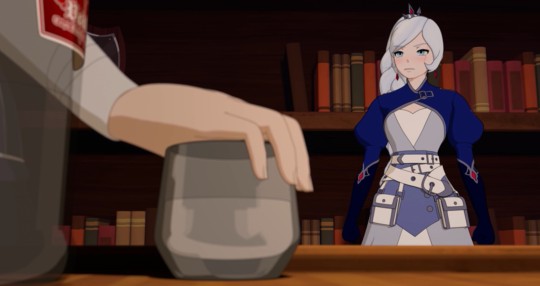
Willow then reassures everyone, Weiss and the audience alike, that she doesn’t expect Weiss to be the family savior.
Willow: “You haven’t come back to stay, have you?” Weiss: “No.” Willow: “Good.”
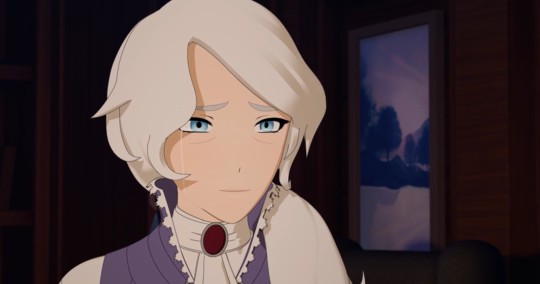
That first line potentially reads as a plea. We might have gotten a scene where Willow is disappointed that Weiss isn’t coming back because she doesn’t want to face this family alone. While a very human and understandable desire, it’s likewise not okay to expect another abuse survivor to return to their abuser after they’ve gotten out. In that hypothetical scene the fandom would have a basis for going, “No. That’s... not okay.” But we don’t get that. Willow is thrilled that Weiss both got out and has no intention to return. She wants her daughter safe. That parental instinct outweighs any selfish, human desire to not suffer this situation alone.
Keep the above point in mind when we read the line, “No matter what happens, Weiss, please don’t forget about your brother.” Willow isn’t telling Weiss to return to the house and save him. She’s not even telling her to forgive him. Just don’t forget him. Remember that he’s not a mini Jacques. He’s another young abuse victim. He’s just like you. When we look at the family dynamic it’s clear that in some ways Weiss had a leg up from her brother that helped her get out. Namely, she had Winter. They’re the ones who are close among the siblings and thus Weiss had a role model to follow. Winter, however she managed it, got out and forged her own path. We then see throughout the series how closely Weiss emulates that, from going into combat herself and having Winter train her. The two actions---fighting and escape---are connected in Weiss’ Volume 5 short. Winter tells her that if she wants to get out she has to get better. That’s your route.
In contrast, Whitley has shown no interest in combat and thus doesn’t have that path to emulate. He’s not a girl and is thus automatically treated as the next Jacques, not the next Winter or even Willow. Most importantly, Whitley doesn’t have a close relationship with an older sibling to guide him.
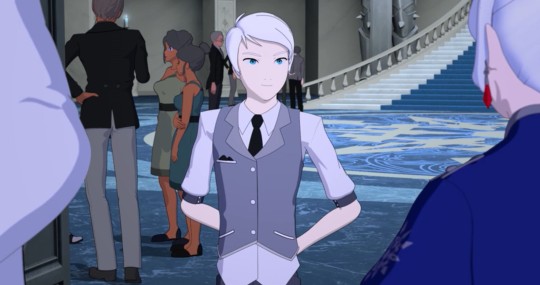
That’s all Willow is asking of Weiss: be for Whitley what Winter was to you. Don’t forget about him. Don’t pretend he doesn’t exist. Don’t fall into the lie Whitley himself believes, that he’s set to be the next Jacques. He’s really an abused 14-15 year old who has suffered through everything we have. So if there ever comes a time where Whitley falters in this belief or you’re given an opening... please treat him like your brother, not your father.
I think that’s a perfectly reasonable thing for a mother to ask and we can easily see via Weiss’ expression that she’s coming to all these realizations too.
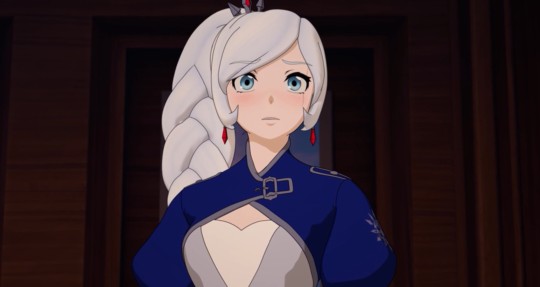
“Of course [Whitley doesn’t want anything to do with you.] You left him alone. With us.” That’s not an accusation, it’s a fact. As established, Willow is happy that Weiss got out, but like with so much in RWBY the best decision doesn’t mean it’s a consequence-free decision. In this case the consequence is that Weiss and Winter left their little brother alone with their abuser. They had to for their own mental health and their safety, but they nevertheless did it. So if there ever comes a time when they can help alleviate that consequence, please do.
It likewise doesn’t escape my notice that, again, Whitley is a guy. Just like the fandom was unwilling to accept Ozpin as an abuse victim, people seem hesitant to accept Whitley as an abuse victim either. From what I’ve seen (and there are admittedly always exceptions) Whitley’s shitty behavior hasn’t gotten an a fraction of the sympathy Weiss’ shitty Volume 1-3 behavior got. They’re three years apart at most. If Weiss is a victim then so is her little brother. Don’t let the Jacques’ genetics and learned behavior fool you.
Finally, we end on Watts. The man who continues to be THE most dramatic bitch in this entire series.
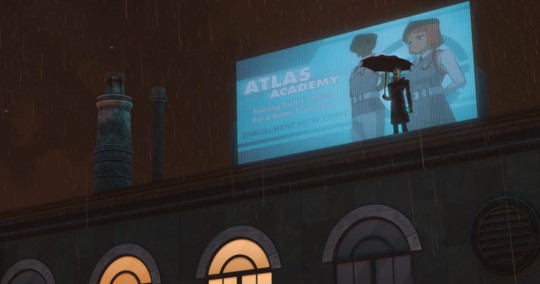
We watch as he shuts down the system keeping Mantle warm. Rather than rain, snow starts to fall. Whether this will be just another generic thing going wrong to make the people angry and Ironwood seem incompetent, or whether there’s a more dangerous downside here (we did hear from Weiss about the deadly temperatures...) remains to be seen.
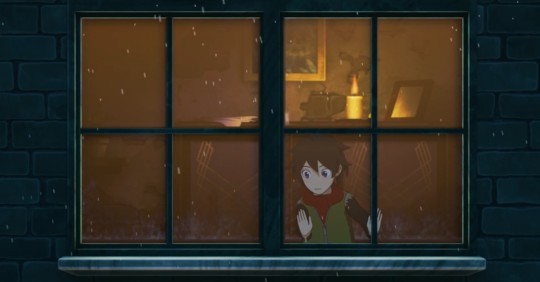
And that’s it. You know, I think that’s the first time in nearly two volumes where I ultimately had more good things to say about an episode than bad. It’s a holiday miracle!
Until next Saturday ;)
46 notes
·
View notes
Text
Critical Role Miniature Rollout: C2E26
With Andrew Harshman
A summary and review of minis used on Critical Role.
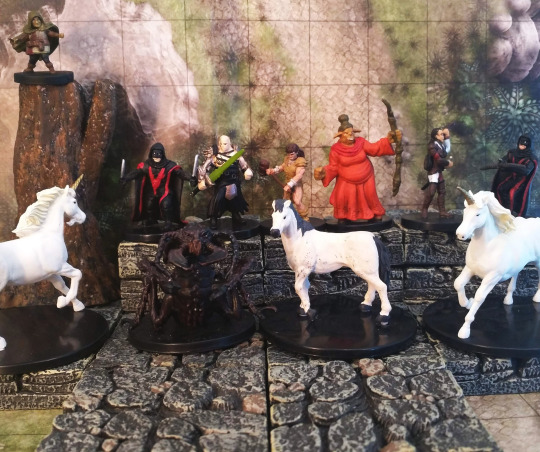
A day which will live in infamy, it’s time for Critical Role Miniature Rollout Campaign 2 Episode 26.
The Characters

Keg SteamForged Games Keg Figure Official Keg Art by @ornerine
Cigarette wielding miniatures are my new favorite thing. Fire up the merrow fight smoke machine! I’m very curious about the production cycle for this figure. It seems like it was done relatively quickly, which is very impressive. This is a fantastic figure! So many great details, the armor, cigarette, and holy symbol/cellphone charm. Just great. If you’ll forgive the nitpick, I wish the miniature’s hair was more accurate. I really dig her doo.
The List
Mats by Mars: Creeping Mold
Mats by Mars: Verdant Fields
Tiny Terrain: Small Tree
Tiny Terrain: Large Tree
Legendary Realms Tall Tree
Legendary Realms Small Tree Stump
Identified Custom Tall Trees
Campaign Coins DEVEN RUE COMPASS ROSE
SteamForged Games Keg Figure
SteamForged Games Trees, Logs, and Stumps
Legendary Realms Wooden Large Open Crate
Icons of the Realms Adventurer’s Camp
Tabletop Props Tent Accessories
Rusty Dragon Inn Dressing: Crate
Legendary Realms Wooden Chest
Legendary Realms Sack Pile
Rusty Dragon Inn Dressing: Cart
Dwarven Forge City Builder Wicked City
HeroForge Custom Miniatures Painted By Iron Tusk Painting
Underdark #30 Ankheg
Deadly Foes #030 Unicorn
Rusty Dragon Inn #025 Riding Horse
Lightfoot Halfing Rogue Epic Level Starter Set
Rusty Dragon Inn #012 Bugbear Mystic
Lost Coast #008 Lamashtu Thug 1
Lost Coast #013 Lamashtu Thug 2
Monster Menagerie 2 #019 Half-Orc Barbarian
Deadly Foes #037 Technic League Captain
Deathknell #25 Voice of Battle
Model Bushes
Foam Elevation Terrain
Possible Custom Wagon
Possible Model Train Boulders
The Terrain
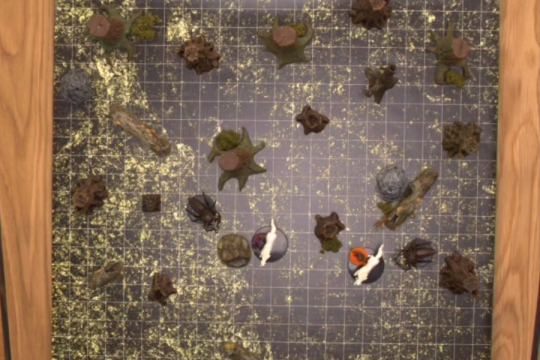
Crisp Vale Thicket Mats by Mars: Creeping Mold Tiny Terrain: Small Tree Tiny Terrain: Large Tree Legendary Realms Tall Tree Legendary Realms Small Tree Stump Custom Tall Trees SteamForged Games Trees, Logs, and Stumps
Most of the terrain components in this episode are familiar to the Critical Role audience, having appeared earlier in the campaign. But I would like to comment on a few, beginning with a model that had me perplexed for some time.
Shout-out Message spell to Redditor calebwidogast for identifying casting Idenify on the previously unidentified tall swamp trees. They are fine looking custom pieces made by Twittoror @RobbieDVO. I especially like how much space these trees take up on the grid. That way you can deploy just a few to the mat and have a significant mechanical effect on the encounter. Beautiful and functional!
This is the Campaign 2 premiere of Mats by Mars: Creeping Mold. As with all Mats by Mars battle maps, this looks very nice. Nice name too, Creeping Mold would make for a good slime monster variant.

Glory Run Road Mats by Mars: Verdant Fields Tiny Terrain: Large Tree SteamForged Games Trees and Foam Elevation Terrain
Matt confirmed the source of the detailed fallen logs seen in this episode as SteamForged Games. Is there any mini they can’t do? Fantastic. The detail on the bark and mushrooms is truly next level. How about a retail release SteamForged, what do you say?
The elevated pieces of Glory Run Road have the appearance of being traditional wargaming crafting foam or some adjacent material. The pieces match the rest of the mat nicely and they are even gridded. Glorious.

Iron Shepherds Caravan Rusty Dragon Inn #025 Riding Horse Dwarven Forge Wicked City Smuggler’s Wagon Possible Custom Wagon Rusty Dragon Inn Dressing: Cart Legendary Realms Wooden Large Open Crate Icons of the Realms Adventurer’s Camp Accessories Tabletop Props Tent Accessories Rusty Dragon Inn Dressing: Crate Legendary Realms Wooden Chest and Legendary Realms Sack Pile
The front wagon, back cart, and riding horse were all used way back at the beginning of the campaign. And all the items inside the wagons have shown up throughout campaign 2. Wicked City Smuggler’s Wagon includes two horses, which makes it an ideal, go-to wagon solution. I’ve not seen this model in-person, so I was surprised and happy to learn that its wheels turn (too bad it didn’t keep moving).
The middle wagon is somewhat of an anomaly. It has the looks of a custom job. I first thought it was a Hirst Arts build. But it lacks any wheel details. With any luck, some light will be shed on this model in the future.
The Monsters
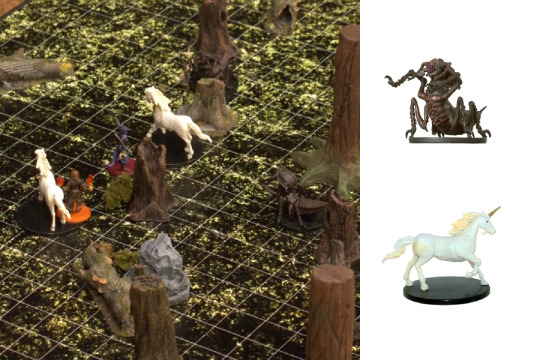
Ankheg Dungeons and Dragons Miniatures Game Underdark #30 Ankheg
I feel like insect miniatures have a sort of creepy and/or crawly quota they need to meet. And the Ankheg is workin’ overtime! Maximum creepy and maximum crawly factor on this one. Good luck to Wizkids and WOTC if they try to make a new prepaint ankheg, it’s not going to be easy to dethrone this big bad bug.
Riding Horses Deadly Foes #030 Unicorn
I’ve got some bad news for fantasy animal lovers. These horse minis are not actually horses. Someone on the Critical Role staff dehorned two beautiful unicorns! But they did leave their unicorn goatees, how humane.
I kid of course. This is a perfectly sensible course of action. If you forgive the simplistic paint work, this is a very high quality figure. It has an awesome galloping pose. The sense of movement is really sold by the flowing mane and tail. And of course the goatee. There really are no prepainted horses that have this level of motion. Very smart move to convert these minis.
The Villains

The Iron Shepherds Icons of the Realms Monster Menagerie 2 #019 Half-Orc Barbarian Pathfinder Battles Lost Coast #013 Lamashtu Thug 2 D&D Miniatures Game Deathknell #25 Voice of Battle
Won Monster Menagerie 2 #019 Half-Orc Barbarian
This is the right way to do a standing pose sculpt. With a worse pose this could have been a massively boring miniature. The body language very effectively conveys potential energy. The positioning and stance all give off this aura of impending action. Perfect for a barbarian on the verge of raging. Don’t get too close though, because barbarians are dangerous, but also because you’ll notice this mini’s unfortunate dirty paint wash.
Thug Lost Coast #013 Lamashtu Thug 2
In Pathfinder, Lamashtu is the goddess of monsters and she has the coolest looking cultists. Who wouldn’t join this cult? The Lamashu cult uniform is like a kitbashed V for Vendetta plus Batsuit. This is another good pose. This figure has so much going for it you forget how rudimentary the paintwork is.
Thankfully, Paizo blessed us with three separate Lamashtu thug/cult figures. What a treat. And perfect for a home campaign where you are trying to give a group of NPCs a distinct look.
Rusa Deathknell #25 Voice of Battle
The Voice of Battle miniature can be seen in C2E1 and I discussed it previously. It’s a good mini and I’m glad to see it again. If we really want to read into miniature selection, one could theorize that Rusa was present at the circus zombie fight. Maybe the Iron Shepherds having been running a long con, hmmm? No, probably not.

Prato Lightfoot Halfing Rogue Epic Level Starter Set
So this is an interesting miniature release. When 5E was new, a product called the Icons of the Realms: Starter Set was released. This non-random pack of six minis included everything you needed for a basic adventuring party. Years later, they did a followup release, Icons of the Realms: Epic Level Starter Set with the same character minis, but leveled up. Pretty cool idea. The characters were made to look more powerful. Their poses are more dramatic, there gear is upgraded, and some of the figures have cool translucent spell effects. Neat stuff. Unfortunately, the Lightfoot Halfling Rogue (if you’ll forgive the pun) really got short shrift.
To make this character “epic” all they did was widen his stance and billow out his cloak. What a bizarre choice.
Photos Sourced From minisgallery.com

Like did the rogue forget to level? He even has the same clothes! Are we to believe that he’s just been wearing the same dingy street urchin background items from level 1? The rest of the Starter Set adventuring group is swimmin’ in spells and treasure while the rogue wallows in scrub gear. That’s not fair. What kind of dysfunctional party is this?!
Moving on to the miniature itself, Epic Level Lightfoot Halfling Rogue is a reasonably fine miniature. The pose is fun and animated, the flowing cloak is cool. Free from context it’s pretty good. But really the Epic Level version should have been the original and this figure should have gotten a proper epic treatment.
Dwelma Rusty Dragon Inn #012 Bugbear Mystic
This half-orc druid is in fact a bugbear mini. This figure is very refreshing. The clothing, the pose, the wartime hair bun. All good stuff and unlike any other mystical monstrous humanoid figure out there.
Another Thug Lost Coast #008 Lamashtu Thug 1
I’ve always had a soft spot in my heart for crossbow miniatures. Combine that with the amazing Lamashtu dress wear and I’m sold! Can’t get enough of this figure.
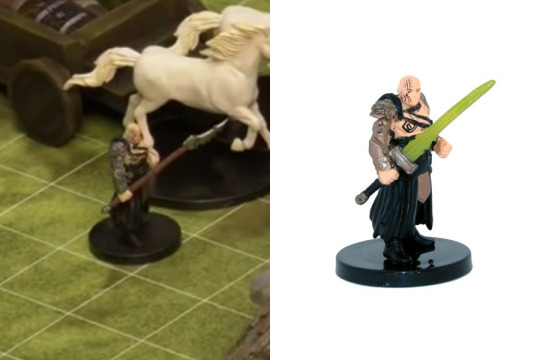
Lorenzo Deadly Foes #037 Technic League Captain
Some more crafty Critical Role production work here, another modified miniature. Lorenzo is a Technic League Captain Pathfinder mini with a polearm weapon swap. The figure has fairly intricate tattoos on it already, so it’s a great match. Factor in the weapon mod and it’s spot on. Except that I believe in-game it was snowing, I should hope that Lorenzo would throw a coat on. Or maybe he just rolls around like this, no shirt regardless of the weather. How obnoxious and arrogant. You know, I’m just gonna come out and say it, call me insensitive if you will, call me impolite if you must, but I gotta say, this Lorenzo guy’s a real jerk.
Closing Remarks
The new studio looks great. I’m very happy with the new miniatures camera. Sure to be an interesting and unique next session, minis-wise and otherwise.
#criticalroleminiaturerollout
11 notes
·
View notes
Text
The Captain’s Secret - p.80
"People They Fall Apart”
A/N: I now take the stage with my baton, the orchestra fully assembled, every instrument in position, and the music begins to play.
Begins the events of episode 12, "Vaulting Ambition." (Small nitpick note, I did skip/fast forward some of the whole figuring out the Tyler/Voq thing for brevity's sake; this is not the Ash Tyler fanfic you're looking for. I have no time to dwell on that plot. And while I dearly love Stamets and Culber, we're also not here to dwell in the mushroom forest.)
In other news, I'm going to print a copy of this story in bound book format for my own personal amusement. If anyone wants to offer a "book review blurb"-style quote, please do a comment or message! I'd love some quotes to put on the back cover. My goal is to send to print on April 9.
To be clear, I'm not selling this fanfic or anything in any way, shape, or form. It's just, I've written a novel-length work (two novels, really) and I want to hold it in my hands as a real book.
Full Chapter List Part 1 - Objects in Motion << 79 - People They Come Together 81 - Pineapple Surprise >>
The ISS Charon, flagship of the Terran Empire and nomadic palace of the emperor, did not linger to admire its handiwork above the planet Harlak. It was a warp-capable fortress of unparalleled firepower and destruction entirely equal the Klingon Sarcophagus of the other universe. Like that ship, which Lorca had enjoyed demolishing, it was an incredibly attractive target to the rebels lingering in the area. While the evacuation of Harlak had not been entirely completed, enough rebels had escaped to pose a credible threat to the flagship if it lingered.
Georgiou left Burnham and the Shenzhou with the strictest orders to finish mopping up any straggling refugees from the planet as the Charon withdrew to more defensible coordinates. Burnham and Lorca were to follow once the Shenzhou's cleanup efforts were complete.
Burnham could ill afford any more indulgences with Lorca when the emperor's summons was hanging over their heads. "See to it that he's ready for transport immediately," she ordered.
As the guards dragged him towards whatever they thought this order meant (probably the waiting agony booth), Lorca shouted at Burnham and the rest of the bridge, "You're all a bunch of lab rats in the emperor's maze. Lab rats!"
Burnham did not know what it meant, only that Lorca was trying to tell her to relay some message. She undertook the task of performing a cursory sweep of the planet for rebels, doing her best to avoid actually finding any, but three small craft were not sufficiently quick or smart to evade detection and Burnham was forced to watch as Detmer fired on them with disinterested efficiency.
While she sat through this display, a transmission arrived from Discovery. Burnham took it in the ready room. It was the Defiant files. Discovery had gotten past the firewall and decrypted the data. Minus the Terran computer security measures, the files turned out to be very small indeed and almost entirely redacted, but that did not make them useless. There was data enough to start theorizing.
There was also just enough time before they boarded the shuttle for her to send a transmission back to Discovery. It was a small, terse, seemingly innocuous message. "Discovery. Thank you for your assistance in bringing the traitor to heel. The emperor has summoned us to an audience. I will be sure to tell the emperor personally of your role in my success when we speak. Whether as a prisoner or a lab rat, Lorca will pay for his crimes." She hoped that was sufficient to convey whatever message Lorca intended by the words.
The lab rat received the message. She sat in her room monitoring the bridge and communications, eyes glinting in the dim warmth, fur wriggling in excitement. Even if the words were spoken by Burnham, she knew they came from Lorca. She pressed the button for the comms. "Einar," she said, "it is time."
Groves and Mischkelovitz were in the lab proper. In a sense, they were beset on two sides. As Lalana emerged from the back of the lab with her silvery color-changing thermal suit in hand, Larsson came in the front. "What are you doing in here?" Groves demanded of Larsson, to which Lalana said:
"Einar and I have very much enjoyed our time with you both, but we are now required elsewhere." She elected to speak for Larsson, but if she were being honest about it, Larsson had not enjoyed his time with Groves and Mischkelovitz particularly. He found them only marginally tolerable.
Groves had been relaxing with his feet up and brought them down at once. "Say what now?" He should have been in Lorca's study attending to the Allan issue of how to trap and kill a probable time traveler who might or might not still be on the ship, but he had opted to work on decrypting the Defiant files in a more familiar setting because Lorca's collection of armaments creeped him out and now he was just avoiding the murder-themed mancave until such a time as Saru called him back. Besides, he and Airiam had been remotely working on decrypting the files together and had gotten a rather good game of chess going in the aftermath.
(Owing to her inhuman appearance, Lieutenant Commander Airiam had been banned from her post on the bridge and Groves was entirely sympathetic to her ensuing boredom. There was no room for either of them in this universe. What passed for law here was barely recognizable to Groves and if ever there was a place that rendered bioethics obsolete, it was a universe where humans were as almost cruel to each other as they were to the aliens they viewed as inferior life forms.)
Mischkelovitz did not look up from the mess of circuitry she was working on. She asked, "Where are you going?" Her flat tone suggested she was only mildly interested in the answer. Whatever research use she had for Lalana was over with and done with. The only reason Lalana was still in the lab was the mistaken idea that Mischkelovitz's current active projects included the lului box in some capacity. That was the secret she and Lalana shared. There had never been a need for the lului box. Or rather, there had been a need, and the need had been getting Lorca to go to Memory Alpha.
"We are going to join the captain," said Lalana, stretching up and gripping the edge of the worktable.
Mischkelovitz went from minimal to excessive interest in the space of a nanosecond. She put down the microwelder in her hands and turned to face them with eyes bright and eager. "Can I come?"
"Apologies, Emellia, but that is not possible."
"Well," said Groves, putting his feet back up and returning to the chess game on his padd, "have fun. It's your funeral."
"What do you mean, funeral?" asked Mischkelovitz.
"Your brother is being dramatic," intoned Larsson humorlessly.
"Am I, though? This whole universe is goddamn deathtrap. Dr. Culber already paid that price."
"Dr. Culber was killed by Ash Tyler," said Larsson, leaning against the worktable and crossing his arms. Maybe he did not have Groves' intelligence, but he was far too big to be intimidated by anything about Groves. He also looked even bigger than usual in his Terran armor. "Or whatever he is. And he came from our world. Honestly, I don't think the universes are as different as everyone seems to think. There are murderers in both."
"This universe is ruled by a fascist tyrant and you don't see the difference?"
"Fascism and tyranny have existed in our world as well. That is why we have words for them. Humans are humans, and they are always capable of bad as much as they are good."
Lalana tapped her top fingers on the worktable in a manner that seemed thoughtful. "I thought you were a moral relativist, John?" she pointed out.
There was a blank look on Groves' face. He had considered himself exactly that until arriving in a universe where the moral relativity broke his concept of the scale. Reading through the files on the data core recovered from the debris field revealed atrocities beyond comprehension. Now he did not know what he was, only that the darkness permeating this universe was something he outright rejected.
"In any event, if we are to die, it was a pleasure to know you both," offered Lalana. "Please also give my regards to Macarius. Einar, if you will assist me?"
While Larsson gave Lalana a hand with her garment and Mischkelovitz whimpered about not wanting Lalana to die, Groves picked up his padd and tried to focus on the chess game. He could not. He stared at the pieces on the black and green board and finally dumped the padd onto the table. "Groves to O'Malley. You up, moron?"
"Good afternoon to you, too," came the acid response. The eye roll felt almost audible.
"You might want to come down here. You're about to lose the rest of your staff."
A minute later O'Malley was on site with a cup of coffee and, of all the incongruities, a powdered donut in his other hand. Mischkelovitz took one look, snatched the donut from him, and broke it in half.
"What the hell do you think you're doing!" O'Malley went, entirely not caring about the donut. (Mischkelovitz put half the donut back in O'Malley's hand, broke off a piece of her half and gave it to Lalana, and began to eat the portion she had claimed for herself. Powder coated her fingers. It did not show against the medical white of her uniform.)
"Got a mission," said Larsson.
"Like hell you do!"
"Captain's orders."
"Oh, Saru ordered you on a mission without asking or telling me?"
"Lorca." Actually, Lorca had not ordered Larsson to do anything, but it was believable enough that he might have and not said a single word to O'Malley.
"You don't answer to Lorca! You answer to me!"
"I resign," said Larsson, carrying through on his perennial threat yet again. "Now I don't listen to anyone."
O'Malley stared indignantly. "I don't accept your resignation."
Lalana hopped between Larsson and O'Malley. She still had her filaments tucked inside her jumpsuit so she looked like a silvery bullet with a blue-grey head sticking out. "If I may point out, now that I am leaving, there is no need for your extra security measures, so Einar is free to resign."
"Wait, you're going, too?" O'Malley suddenly noticed Lalana was wearing clothing.
"Captain Lorca requires my presence," was her only explanation.
O'Malley shook his head. Children, all of them. "You understand you're not the sole reason for the security here, right? There's valuable research in this lab." Mischkelovitz's eyes went wide at O'Malley's words. Her brother didn't know the half of it. She shrank back towards her desk and debated going into the crawlspace.
"There is valuable research everywhere on Discovery," said Lalana. "I was the only thing that was secret about this room. Now this room is like all the others and may be guarded exactly the same way. But since you are here, allow me to say this in person. In the event we do not survive our journey, it has been a pleasure knowing you, Mac." She even did him the kindness of not calling him his full first name.
There was a horrible silence as that sank in. "Why... where..."
"Do not worry," Lalana said. "I have lived a very long time compared to you and Einar and I are not afraid of this eventuality. We will of course endeavor to avoid it, but there is no need for concern if this should come to pass. We are glad for the time we have known you. That we met at all in the vast cosmos was such an unlikelihood it is what you would describe as a miracle. A thousand million tiny things had to go exactly right for us to meet all of you and they did. Please do not cry, Emellia. Think of us in this moment always, as your friends. Now come, Einar, our shuttle awaits."
They made as if to leave. "Hold on!" said Groves suddenly, his feet coming down off the table again. "You're flying a shuttle in?" That was, he knew, an absolutely, completely terrible idea because even if the shuttles were mocked up to look Terran, they did not have valid Terran transponders and security ident codes and if the Defiant files were any indication as to the sorts of security measures Terrans employed, that shuttle was going get blown out of space the moment it got near the Charon. It would not hold up to any sort of scrutiny. "Let me give you a pineapple."
"Thank you, but I just ate," said Lalana, referring to the piece of donut. "Perhaps Einar is hungry?"
The word seemed to mean something different to Groves and O'Malley than it did Lalana and Larsson. O'Malley's eyebrows shot up. "Is a pineapple an option?"
"Of course," said Groves. "Why wouldn't it be?"
"Well, I don't know, we're in a different universe, aren't there different rules of physics or something?" The light here really did seem strange.
"No, you moron, the quantum variance here doesn't invalidate pineapples." The point at which changes in physics would break a pineapple was also potentially a point at which reality was collapsing and there were bigger problems to worry over.
"Well, then, by all means," said O'Malley, and smiled at Groves. "I do so love pineapples, they're my favorite fruit."
Groves grinned back a grin stretched so wide it threatened to turn into a laugh. "One pineapple, coming right up!"
"I don't understand. How is fruit going to help?" asked Larsson.
"Oh, you'll see," promised O'Malley as Groves and Mischkelovitz began to gather materials from around the lab.
Lalana hopped onto an unused table on the far wall. She loved watching things happening and it was a very nice vantage point.
The sweep of the rebels was done. Burnham sat at the shuttle controls as it left the Shenzhou's shuttlebay and tried not to focus on the fact they were about to fly towards the worst possible reality she could have imagined.
Luckily, she had a small but encouraging distraction on hand. She joined Lorca in the rear of the shuttle as the autopilot took over and showed him the Defiant's data. "The file has been redacted, but there is some data on how the Defiant crossed into this universe. A phenomenon called interphasic space, but where that space is, the exact coordinates? Struck from the record."
She had to put the padd in his hands for him; he was almost entirely restrained for this little transport exercise and his fingers and head were about the only parts of him that could move. "All right, well, we'll just have to hunt down the original report. If the complete archive's anywhere it'll be in the Imperial Palace which is..." Lorca inhaled. "Fortunately where we've been summoned. Some people would see that glass as half full." He smiled at Burnham. Right now it felt a little like his cup was running over.
Burnham did not smile back. She was having trouble understanding how anyone could still find anything to smile about at this point. Between Tyler and Georgiou, she had lost what limited capacity she had for that expression of human joy.
She had, at least, brought him a nerve dampener to counteract the worst effects of the agonizers. She injected it and he reached out and put a hand on her arm, the only part of her he could reasonably reach in the restraints.
"Listen to me. You'll get the data we need on the Defiant and you'll get us out of there. I know you will." His face was so earnest, so sincere, so hopeful. He had confidence in her.
She couldn't look at him. Whatever Lorca thought he saw in her, she no longer saw in herself. She darted away towards the front of the shuttle.
"Burnham!" he called after her. Guilty, she looked back. "I need you. You need you. What are you afraid of?" There was a comfort in his tone, an easiness that went against everything Burnham was feeling.
The insignia badge of her beloved captain found its way into Burnham's hands. Its surface was crisscrossed with ugly scratches. It was the only connection she still had to the person she had been before the Binary Stars.
Those scratches were her fault. Everything, it seemed, was her fault. Yet for some reason Lorca had the gall to still look at her and see some sort of potential.
"Georgiou," she admitted. "Logic tells me she's not the woman that I betrayed. But this feels like a reckoning."
"Your Georgiou is dead," Lorca reminded her, voice taut.
"Haven't you ever been afraid of a ghost?"
He did not fear his ghost, he lived for her. She was less a ghost and more an impossible dream to live up to. A miraculous dream at that.
As the warp drive disengaged, the light of the Charon's massive energy core made Lorca wince and turn away from Burnham. She, of course, turned right towards the light. It did not hurt her eyes to see it. She slipped Georgiou's badge back into her pocket.
They would be docked in a moment and she had one lingering question.
"What did you mean on the bridge when you referred to lab rats?"
For a moment, Lorca worried Burnham had not understood his intent. "Did you pass the message on?"
"I did."
He sat in somber silence a moment. "Just letting someone on Discovery know not to worry, I'll be home soon enough."
"Dr. Mischkelovitz?" The code had been obvious when she thought about it. Lorca was known to frequent Mischkelovitz's lab, a lab Mischkelovitz rarely left, and miš was the root sound for the word "mouse" in most Slavic languages.
"Very perceptive," said Lorca, choosing not to correct Burnham. So many times now she had tried and failed to guess at his motives and feelings. He could not recall a single time Burnham had guessed right. From accusing him of biological weapons manufacture to the Ripper situation to this very moment. All these months and she still didn't know him. Let her think she did, though. Let her think whatever it took to get them both through this.
As the shuttle came to a rest in the bay, Burnham thought it unfortunate that Lorca might have a connection of a romantic nature with Mischkelovitz. Not only did she know from Tilly that Mischkelovitz had severe social issues and was probably easily taken advantage of by someone with Lorca's charisma, Mischkelovitz was only three years older than Burnham. Lorca was old enough to have fathered either of them. Throw in the imbalance of power between captain and junior crew and it was exactly the sort of thing Captain Georgiou had warned Burnham about.
The shuttle doors opened. Burnham shoved aside her grief and strode out with a veneer of savage confidence, barking orders at the shuttlebay crew to attend to her prisoner and not keep the emperor waiting. Lorca stumbled out behind her, the emperor's guards pushing and shoving him every chance they got.
Neither of them noticed a tiny piece of debris left in the shuttle. It had fallen out of Burnham's pocket when she pulled out Georgiou's rank insignia during the trip. A tiny slip of paper with the words "You will be called to fill a position of honor and responsibility" printed on it.
Saru found himself running into more problems than he could ever have anticipated.
Lieutenant Stamets was slowly improving, but he wasn't out of the woods yet. The unfortunate truth was that he was still in a coma. Tilly remained tirelessly optimistic, insisting something positive was happening in Stamets' head, but whatever it was, it was not happening fast enough to get them out of this terrible situation.
The monster that was both Ash Tyler and Voq was having a medical emergency. Now that both sides of his consciousness were awake—the native Klingon personality and the human one that had been forced on top of it—his brainwaves were in a state of chaos. One moment he was Voq, the next Tyler. At this rate, there would be no tribunal, there would be no anything, because whatever was laying in sickbay was going to die.
Even if that person in sickbay was entirely not Ash Tyler, Saru had no intention of seeing anyone else die on his watch.
Then, because all of that was not enough, a message from Owosekun on the bridge: "Captain, did you authorize a shuttle launch?"
"I most certainly did not!"
Operating as captain without being on the bridge was proving to be a disaster. Saru turned to the nearest wall console in the corridor outside the medical bay. "Who is aboard? Open a channel!" The channel opened, audio only. "Shuttlecraft, identify yourself!"
"Sorry, captain, tried to give you a heads up, but your hands were full in sickbay."
Saru recognized the voice. "Lieutenant Larsson, return to the shuttlebay immediately."
"No can do. We're already running late. That fruit delivery cost us precious time."
What that meant, Saru was not sure. Then he realized it was human humor. The sort of humor Lorca often employed to diffuse high-stress situations. Saru would never understand that instinct. "What do you think you are doing?"
"Secret mission. You-know-who's orders."
"Lieutenant, if you do not return that shuttlecraft immediately, we will be forced to open fire." At the tactical console, Rhys armed the phasers in preparation. The action was pointless. Saru could not bring himself to command the phasers used against a fellow Starfleet officer, not in light of his determination to get everyone from their universe home alive.
"Ah, right, you haven't heard! I resigned from Starfleet. Again."
Or, for that matter, against a self-declared civilian, even one in the process of a stealing a ship.
"Beam him off," said Saru sharply.
"I can't get a lock," said Owosekun over the comm. "It's like his life sign is only partly there."
Saru realized what was happening. Larsson's usage of the plural "we." A single, unlockable life sign. Lalana was on that shuttle. It even explained that strange mention of "lab rat" in Burnham's last message.
"Love to stay and chat," said Larsson, "but my friend and I have an appointment to keep. Wish us luck!"
The channel closed. Saru stared at the emptiness on the monitor. The bridge was still waiting for orders. "Captain, do you want us to pursue?"
Saru wavered a moment. What was the right course of action here?
"Captain?"
The answer came. "No. Maintain our present position and resume standing orders."
"Aye, sir."
The next command was to open a comm to O'Malley, whose explanation was as unhelpful as it was clarifying. "They have left on the command of Captain Lorca?" Saru echoed.
"That's what they both said. Obviously, I had no idea you were as clueless as me."
"You might have told me Larsson had resigned his commission," Saru noted.
"Honestly, Saru, he says that twice a week. It's always been an empty threat."
"I am presently your captain," Saru corrected O'Malley.
"Yes, captain," said O'Malley without hesitation or resentment. "I'm afraid that's all the information I have."
Saru let O'Malley go and stood in the corridor deep in thought. He was not certain whether he had just made a mistake or not. That shuttlecraft was a risk they could ill-afford, but Burnham had not been in contact since that last cryptic message, so perhaps this was some sort of special contingency Lorca had devised in case of trouble. Were there other sleeper agents in among the crew, waiting for cryptic turns of phrase to rush out and execute other secret orders? Most likely not, but given Lorca had not informed Saru as to Lalana and Larsson's operation, there was a nonzero chance of something like this happening again.
In Lab 26, O'Malley and Groves exchanged a look. "Do not tell him about the pineapple," O'Malley said, white as a sheet.
Groves held his hands up and shook his head repeatedly. He had no words. Either they had just assisted in the execution of some sort of top secret orders or they had unknowingly aided and abetted a pair of transdimensional fugitives. Possibly somehow both.
Eventually, Groves did find words again. True to form, they were an indictment of O'Malley. "I'd just like to point out, where your staff is concerned, you are oh-for-two, Mac."
"Shut up, John," said O'Malley, but he was thinking the same. He felt like a failure. He had not technically chosen Larsson or Allan, but he was responsible for them and both had disappeared under questionable circumstances on his watch and now he was left holding the bill for their actions. In every conceivable way possible he had proven inadequate as a leader.
Then again, he had always known he was a follower in every aspect of his life. If only he had possessed the guts to stand up to Cornwell when she offered him this assignment. He always did what everybody else wanted. No wonder everyone thought him such a fool.
As he stood there thinking this, he heard the most familiar words he knew manifest in the room: "I love you, Mally." It was, as always, an attempt to cheer him from a morose moment.
"Just as much," he answered, voice hollow and automatic.
Burnham was left reeling in the aftermath of her audience with the emperor. The way Georgiou had beaten Lorca when he refused to bow to her, the promise of enduring torture for the stubbornly defiant captain, both of these things had been expected but still shocked her.
What she had not anticipated was the pure, unbridled confusion that followed when the emperor stepped forward and expressed her happiness at Burnham's return, eliciting applause from the assembly of Terran officers and bureaucrats around them. Georgiou had touched her hand to Burnham's cheek and spoken words that still echoed in Burnham's mind:
"Everything will be the way it was, dear daughter."
Part 81
#Star Trek Discovery#Star Trek#Discovery#fanfic#fanfiction#Captain Lorca#Mirror Lorca#Gabriel Lorca#Mirror Gabriel Lorca#Michael Burnham#Commander Saru#Vaulting Ambition#Captain Gabriel Lorca
1 note
·
View note
Text
Doctor Who Reviews by a Female Doctor, Season 4, p. 3
Midnight: Davies has written a lot of epic, sometimes overblown stories, but this relatively quiet piece of terror is easily his most impressive, and it gives us more insight into the Doctor than perhaps any other episode in his time as showrunner. The supernatural presence in this episode is never defined or explained, but it never stops being terrifying. In general, the episode’s minimalism works sublimely well—the lack of spectacle and setting allows us to focus on the characters and the fear that they feel. Fear has rarely been more palpable on this show, especially in the long, chilling sequence of repeated language, and Alice Troughton’s magnificent direction and Tennant’s sublime performance keep the tension building for the entire episode. It’s one of the scariest episodes the show has ever done, but in spite of how frightening both the unknown presence and the panicking humans are, the episode isn’t completely without hope, and the pieces of light make this very dark episode much more meaningful than the straightforward piece of horror that it would otherwise have been.
The Doctor behaves here as he generally does—he’s interested in the people around him, he enjoys their company, and he’s determined to protect everyone once the danger becomes evident. If Donna had been with him, she might have balanced out his know-it-all tendencies enough to make his efforts to take charge more palatable, but on his own, the Doctor is a giant spectacle of brilliance and heroism, and some of the episode’s effectiveness lies in its understanding that in a moment of crisis, these qualities are less comforting than one might think. The Doctor doesn’t just fix problems, he does it with a flourish, and this draws attention to his personality in a way that can make him feel like part of the terror rather than a way of fighting it. I’m still not a huge fan of the depiction of Luke in the Sontaran episodes, but his bratty insistence on his own cleverness provides an interesting piece of context for the Doctor’s assertion that he should be in charge because he’s clever. The Doctor is by far the smartest and most capable person on board, but his assertiveness does come across as off-putting and perhaps inappropriate here; in the middle of a genuine panic, there are few things more terrifying than seeing someone who seems far less frightened and confused than he should be. He doesn’t really do anything wrong here; he’s had far worse moments of arrogance and narcissism at various points in the show, and he responds rationally and intelligently to the threat. He’s so busy being the hero, though, that he’s rarely seemed less human, and the lack of a human companion by his side makes this all the more dangerous.
I definitely miss Donna in this episode, but I get why this story required her absence, and I think it’s kind of awesome that she decided to sit out an adventure in favor of relaxing and enjoying herself. The need for drama means that we only really see the more thrilling pieces of the Doctor’s travels, but I’d definitely like to think that he and his companions at least occasionally put their feet up and have a margarita. Because this is mostly a companionless story, the minor characters have especial importance, and they’re an absolute triumph. I was surprisingly attached to Sky Silvestry, in spite of the fact that she becomes possessed so early in the episode that we get very little time with her actual personality. Everyone else is unusually well-rounded for one-episode characters, with the one exception of the Hostess. She is far less defined and generally easy to ignore, which makes her act of self-sacrifice all the more dramatically satisfying. She’s a startling savior, given that she’s spoken very little in the episode and has reacted far less vehemently than anyone else around her. We might have expected the more knowledgeable Dee Dee to be the one to figure things out, or even Jethro, who seems frustrated by his parents’ unwillingness to listen to his ideas. The Hostess has been a pretty unremarkable presence for the rest of the episode, and, as the Doctor remarks after she is dead, we never even learn her name. She listened, though, to the Doctor as he engaged in small talk at the start of the journey, and that’s enough to let her know how the alien presence is working even when all of the theorizing of the other characters completely fails. There have been many highly distinctive, memorable personalities on this show, but I love that we get an act of heroism here from someone who has otherwise faded into the background—this creates a surprising ending, but more importantly, it creates a brilliant disruption of the horrifying portrait of human nature that appears throughout the episode.
A story like this definitely runs the risk of becoming so angsty and dark that it’s just unpleasant to watch, but I think it mostly avoids this. It’s definitely bleak, and I will say that this is not an episode that I’ve rewatched a lot—certainly less so than any of the other episodes near the top of my list. This is why, although I can definitely understand seeing this as the best episode of the reboot, for me it’s maybe sixth or seventh best, because there are other episodes that are about as brilliant and that I just like watching more than this one. Still, in spite of the bleakness, the episode ends on an intriguingly specific moment of redemption. This is partly because of the Hostess’s stunning moment of self-sacrifice, but what also really interests me about this moment is the fact that the Doctor is essentially saved by the quirks of his own self-expression. The scene makes it very clear that the Hostess realizes what has happened only when Sky begins to say the Doctor’s catchphrases: “Allons-y!” and “Molto bene!” These are generally presented as fun little pieces of dialogue, not as items of especial importance, but here they take on much more significance. The Doctor’s ego is definitely on display in this episode, and he makes clear that his status as the smartest person in the room is constantly on his mind, but it’s the tiny sparks of personality that wind up mattering here. There’s something really beautiful about having a voice so distinctive that it’s recognizably yours even if it’s been taken by force, and it’s a fitting tribute to the Doctor that it’s not his cleverness or courage that makes the difference in the end, but rather his unmistakable uniqueness. A+
Turn Left: Well, one episode after the Doctor gets a pretty clear message that his assumption that he is the world savior at all times can be obnoxious and frightening, we learn that if the Doctor wasn’t here to save us, we’d be in a terrifying dystopia within about a year and all of reality would start to disappear shortly thereafter. I still love the incisive look at the Doctor’s ego in “Midnight,” but we maybe could have followed it up with a little bit less of a validation of that ego. Anyways, the Doctor-less world is a fascinating concept, and it lets us have an entire episode focused on Donna. Some fans consider this to be among the best episodes of the reboot, and I definitely think it is one of the best ideas, but it switches with frustrating rapidity between brilliance and mediocrity, making it difficult to enjoy even the unequivocally good parts.
The structure of the episode is one of the items that alternates between stupidity and near-perfection. I do find the ways in which we learn of the deaths of the show’s major characters to be genuinely chilling. The fairly quiet portrayal of these events, generally conveyed through brief announcements on the news, makes for a much more heartrending sequence than what would result from a flashier depiction of the deaths. Hearing characters like Martha and Sarah Jane being killed off in a couple of sentences, as if they barely matter, is just so shocking that the deaths are very alarming, even though we know that this is an alternate universe and everything will probably go back to normal soon. The actual shape of the story doesn’t work quite as well for me, although I do love that it resolves the “something on your back” line from “The Fires of Pompeii.” The beginning has a weirdly Orientalist vibe—“Donna is attacked after naively trusting a mysterious, sinister Asian fortune-teller” sounds like the kind of story you’d expect to find in about 1897. The idea of the Trickster is interesting, but a lot of his abilities get explained on The Sarah Jane Adventures, which makes this episode a bit difficult to follow if you haven’t seen that show. In general, I really like the way that Davies creates links between Doctor Who, Torchwood, and Sarah Jane, but usually it’s possible to understand this show even if you don’t watch the spinoffs, and I’m not sure that that’s the case here. Still, the plot is more than anything else an occasion for us to watch a different version of Donna interacting with Rose, so a few moments of confusion are all right.
This is the episode in which Rose finally returns properly, after several miniature cameos throughout the season. I loved those brief appearances, which I thought were a stellar way of hinting at what was to come, but her actual return is underwhelming to the point that I sort of regret the entire decision to bring back the character. It makes sense that she is different from the Rose that we knew in seasons One and Two, as this shows the impact of working for Torchwood and of living with her loss of the Doctor. I fully understand making her more serious—and, really, I wanted them to show her changing more than she did in Season Two—but there isn’t much of an effort to make that work for the character here. If we had seen a more gradual change across Season Two, this would be more believable, but she just seems like a completely different character; aside from the brief moments when she remembers how great the Doctor’s hair was and when she first watches Donna enter the TARDIS, there’s so little of Rose’s personality here that it just feels like they cast Billie Piper in a different role. Even The Moment in “The Day of the Doctor” has a little bit more of Rose’s personality, and that is literally not Rose at all and is just an interface using Rose’s image. She doesn’t get anything interesting to do here; I love that she has clearly gotten really good at her job, but in this episode, she basically turns up, tells Donna the information that she needs to know, and then vanishes, while being annoyingly and sort of needlessly cryptic. She uses some of the Doctor’s language (“I’m sorry. I’m so sorry”) but she doesn’t have anything that reminds us of her own character, and even the Serious Rose angle goes back and forth between seeming like an awesome professional woman and putting on a weird affect that makes her look like she’s been drugged. I really find Piper’s performance odd here, but I’m assuming that Davies or the director told her to play the character like this because Billie Piper is a stunningly fabulous actress and she could have done so much better than this. On the one hand, regardless of the portrayal of Rose herself, we do get two women saving the world together, which is great. (In general, this is one of the most female-centric episodes of the reboot; Wilf and the Italian neighbor get a fair amount of screen time, but the other major characters are basically all women.) On the other hand, this is the first sustained return of Rose after her departure, and it’s a lot less great that for much of the episode, she’s just a plot device, and kind of an irritating one.
In spite of the attention given to Rose and to the numerous character deaths, Donna is the star here, and even when I’m not thrilled about what the episode is doing with the character, it’s wonderful to see her get so much screen time. I’ve heard this referred to as the episode in which Donna stops being a joke, but I don’t think this is true at all, as she’s been a non-joke since the end of “Pompeii” at the latest. It is an interesting shift for the character, though, in that we finally get to see her in ordinary circumstances for an extended period of time; between her departure with the Doctor at the end of “Partners in Crime” and her return at the conclusion of “Journey’s End,” the Sontaran two-parter is the only time that Donna visits home, so even with an alternate universe and alternate Donna, this episode provides an important piece of context for a character who uses the TARDIS to escape from ordinary life more than any other companion. Granted, “ordinary” has taken on a new meaning here, as the world has collapsed into a dystopian mess, but we see her in a lot of situations that don’t involve dealing with the supernatural. Brief as they are, it’s nice to get scenes of Donna going out for drinks with her friends, singing “Bohemian Rhapsody” with her housemates, or railing against her employer as he fires her. It’s a little frustrating that we get this kind of material only in an alternate universe episode, as it still just leaves us with the idea that this is what Donna’s everyday life would have looked like if her life had been quite different from what it was; still, the episode conveys her sadness and hopelessness beautifully, and it is definitely the best portrayal of her relationship with her mother. The situation they are in is so terrible that Sylvia’s tendency toward complaint has more depth than it usually does, and this makes her into much less of a caricature than she is in other episodes. The episode doesn’t sugarcoat the problems between these two—Sylvia makes clear that she’s basically given up on her daughter—but their difficult relationship is nuanced and believable, and ultimately very moving.
This episode lets us see more of the flaws that Donna had mostly overcome even by the earliest episodes of this season. In the absence of the Doctor, her tendencies toward self-centered shallowness haven’t been challenged, and it’s interesting to see more of those qualities here, although I think that one scene might go too far. I like the scene in which she just keeps yelling about her own problems while the hospital gets transported to the moon, but I’m less pleased with the scene that depicts her as somehow not realizing that immigrant labor camps are a problem until Wilf points out the obvious to her. The former scene works because lots of people tune out the suffering of others that they see on the news. Donna is definitely being portrayed as self-centered and callous here, but she’s taking on those qualities to a degree that seems believable and doesn’t make her look like a psychopath. There’s a difference, though, between ignoring the misfortunes of strangers on the news and being completely oblivious to the pain of your friends when they’re standing in front of you, and I just don’t buy that she would be quite this disengaged, even in a giant dystopia in which lots of different terrible things are happening. She thinks her housemate is loud, but she does seem to like him, and having people she knows being rounded up on a wagon and taken to forced labor camps on the grounds that they are immigrants is a pretty big thing to overlook. She does get upset about it once Wilf starts talking about “the last time,” but she swallows her neighbor’s cheerful lies about the labor camps being all right so easily that she comes across as having the awareness of a six-year-old. My concern here is that it makes the change that the Doctor produced in her seem bigger than I assumed it was. The general impression that I get of Donna is that she has quite a lot of natural empathy, courage, and generosity, but she felt like she had so little control in her life that she didn’t really make use of those qualities as much until the Doctor awoke those feelings in her and made her try harder. This scene makes it look like the Doctor basically gave her a new brain, or at least implanted some qualities in her that hadn’t existed prior to their meeting, and I would prefer to stick with the idea that the Doctor brought about an awakening in her and not a total personality transplant.
I’m also conflicted about her act of self-sacrifice that returns us to the show’s normal universe. Part of my issue with this is that the season has by this point leaned too hard on the notion that good people die protecting the Doctor. I get why this is here, because it’s going to come up in the finale, but of the past six storylines, this is the fifth to resolve things through the structure of “The Doctor is dead/about to die but someone [takes his place on the exploding Sontaran ship/jumps in front of the gun/takes the fatal charge of the library computer in his stead/throws herself out the airlock/jumps in front of a van] so that he can live.” It reads more as an attempt to build a theme than as an inability to think up a wider range of endings, but this should be a really big moment for Donna, and I think the impact is diminished by the fact that we’ve seen similar actions in so many recent episodes, especially since the scenes in “Midnight” and “Forest of the Dead” were so brilliantly done. In spite of the repetition, her moment of sacrifice is very dramatically effective, but I like it less the more that I think about it. The Donna who travels with the Doctor has been shown to be smart, compassionate, resistant to being told what to do, and good at making connections with people. She’s valuable because of who she is, and what her heart and mind bring to their adventures together. The version of Donna that we meet in this episode has a tremendous moment of embracing death for the good of the world, and she does show some quick thinking in figuring out what needs to happen, but ultimately she is valuable because her corpse causes a helpful traffic jam. It’s not even the case that she’s doing something useful and gets killed while doing it—what the story needs is a body in the right place on the road, and she allows her own body to serve that function. Her death is very meaningful here, but in the rest of the series, her life has value, and while this episode ostensibly lets Donna find a sense of heroism without the Doctor’s help, it winds up emphasizing how much her personal growth depended on the Doctor’s influence. It’s not unreasonable to suggest that Donna was fundamentally altered through her travels with the Doctor, but this episode is sometimes celebrated as an empowering vision of how Donna would have been amazing even without the Doctor, and to me this ending doesn’t really manage that.
Sacrificing your life in order to protect a different version of yourself is an interesting psychological scenario, although the time constraints of wrapping everything up in one episode means that we don’t get to go into this very much. I can imagine that if you were feeling hopeless and valueless, news of another you running around helping to save the world would be an odd thing to experience. It might be thrilling to learn of a better version of yourself, but it could also be immensely frustrating to look around at your actual circumstances and see how different they are from this vision of your ideal self. It’s a fascinating concept, but the episode doesn’t quite have time to go into the complexities of her feelings about this. The story’s conclusion makes clear that AU Donna values the version of herself who travels with the Doctor more highly than she values herself, although the degree to which this is a world-saving act of self-sacrifice versus a somewhat self-interested attempt to take on the better version of her own life is unclear. The relationship between the two Donnas is also unclear to me; Rose denies the notion that AU Donna will simply become proper Donna, but she is able to remember the phrase “Bad Wolf” at the end, which suggests that at least some of AU Donna’s consciousness transferred into the primary Donna’s mind. I’m possibly just looking for more of a metaphor than the story is actually trying to depict, but I keep feeling like I should be able to understand more about actual Donna on the basis of what we see of her alternate self, and I never really get much insight into her beyond a general sense that she’s a good person whose life would have been much worse without the Doctor in it.
I’ve spent a lot of time talking about problems in this episode, which might make this review reflect more negativity than I feel; in spite of my dislike of this episode’s approach to Donna, she still gets some great material. I’m not sure if a companion has ever been given as much of an emotional range to work with in a single episode, and Tate conveys the characters feelings—her hopelessness about life, her panic and terror about her role in events, her occasional moments of enjoyment in spite of everything—in a tremendously detailed, utterly believable performance. I wish that we had been given a more coherent vision of what it would be like for Donna to find some of her best qualities without the Doctor’s assistance, but there are moments in which Davies gets things exactly right, like this exchange between Wilf and Donna: “You’re not going to make the world any better by shouting at it.” “I can try.” B+
The Stolen Earth: I find it difficult to evaluate this episode, because it sets up a lot of plot developments that I wind up hating, but they don’t really go awry until the next episode. I really liked this one the first time I saw it, and I do think that it’s mostly very good, but after watching “Journey’s End,” my frustration with that episode spoils some of my enjoyment of the setup that this episode provides. Taken on its own, though, this is an exciting piece of television with a lot of lovely guest appearances, so it’s not really fair to criticize it for a subsequent episode’s problems.
In some respects, the huge cast is a limitation of this episode, because there are just SO MANY characters that it feels like we can’t spend enough time with any of them. Watching an episode starring The Doctor, Rose, Martha, Donna, Captain Jack, Gwen, Ianto, Jackie, Mickey, Wilf, Harriet, and Sarah Jane sort of feels like being a puppy when lots of humans come into the room; you want to rush over to someone and wag your tail in excitement, but there are so many humans that it’s easiest to just sort of run around in circles. Even if the episode does pull in slightly too many directions, though, they’re mostly very good directions. Martha continues to be a much better character this season than she was in the previous one, and the episode does a great job of creating tension about how long it would take for anyone to notice that Rose is back on Earth. (Rose continues to demonstrate the skills she has honed in the parallel universe, but she seems like herself again, which makes the previous episode’s weird portrayal of the character even stranger.) My favorite return, though, is that of Harriet Jones, which goes a long way toward remedying the awfulness that happened with her character in “Christmas Invasion.” I don’t know if this was the plan all along or if this was a response to criticism of that episode, but she gets back all of the dignity and integrity that “Christmas Invasion” took away from her, and she’s just marvelous. I’m sad to see her die, but I love that she is given a thoughtful, brave, heroic death that totally redeems her from the earlier nonsense.
There are some really lovely moments of plotting here, in which we find out what has been going on with the various missing planets mentioned throughout the season and why the bees have been disappearing. Davies has woven these ideas into the fabric of the season in a really understated way, and they come together beautifully here. He’s really very good at introducing details like this without telegraphing that they’re going to play a major role in the seasonal arc—both this and the early pieces of the Harold Saxon storyline are set up with impressive subtlety. We also get to see the Shadow Proclamation and the return of the fabulous Rhinoceros Police, so there’s plenty of great material to enjoy in this episode.
In spite of my enjoyment of most of the plot here, it does feel like the storyline that’s taking shape here is a massive departure from the rest of the season. The strong character work in many episodes has given this season a sense of intimacy, and the delights of the Tenth Doctor/Donna pairing have created a consistent sense of fun, although the last couple of episodes already started the movement away from that. Season finales tend to be big and epic, so that’s unsurprising here, but the focus on so many different characters and the sudden raising of the stakes makes this feel disconnected from most of the episodes that came before it. Still, it’s a solid piece of setup, and the final moments, in which the Doctor is shot down by a Dalek just as he finally sees Rose again, create a terrific cliffhanger. A-/B+
Journey’s End: Oh, good grief. About nine million things happen here, and a lot of them are absolute nonsense, but the frustrating thing is that the episode is occasionally brilliant, so we get a tantalizing sense of what this episode might have been like if the good elements had been grounded in a more believable story. Part of the problem is the continuation of the previous episode’s tendency to seem much bigger than the season’s storyline can support. The placement of details about disappearing bees and planets has been impeccable, but while the season has been superb at conveying the necessary exposition in a subtle manner, it has done nothing to prepare for the tone that this finale takes. Both of the next two season finales also work with crazy plots and extreme emotional intensity, but in both cases something of that tone is established at the start of the season and continues to make appearances throughout the season, so that by the time we reach the finale that energy makes sense. Here, the plot just feels like it’s overflowing from its container; I quite like the idea of a reality bomb, but if you want me to believe that by making a bunch of planets into a big space diorama and then pressing a button the Daleks can wipe out not only this universe but also all other universes as well, you really need to prepare for a story of that magnitude, and the relatively small-scale feel of much of this season doesn’t do that at all.
In addition to seeming at odds with the tone of the season, this episode also draws upon previous seasons to an unfortunate degree. The plot is essentially this: the Daleks have been trying to destroy the universe, as they do, and the Doctor is trying to stop them. There’s a possibility of defeating the Daleks through major violence, like destroying the Earth, but the Doctor is against it because he is a man of peace. Just when it looks like the Doctor has failed and the universe is in great peril, it turns out that the Doctor’s companion, who has gone off in the TARDIS without him against her will, has unknowingly absorbed a huge amount of abilities that vastly exceed anything she has ever been able to do before. She turns up at the last minute and saves the day, her “just so human” qualities combining productively with her new powers, thus explaining a phrase that was brought up earlier in the season and creating an awesome moment in which the ordinary, working-class woman saves the world. Unfortunately, her body can’t take this influx of power for long, and so it has to be removed from her, and sadness ensues. I liked this plot when it was called “The Parting of Ways,” but this episode takes the framework from that finale and exaggerates it until it ceases to be enjoyable.
This show has repeated concepts plenty of times, and it usually works, because the constant recasting means that we can take a concept from a previous episode and see how it works differently with a new Doctor or companion. This many recycled elements in one episode, though, is just too much, and once again it doesn’t quite manage to give Donna the moment she deserves. On the one hand, I do really love the reveal of the human-Time Lord metacrisis; it’s fantastic to see Donna be the hero for a while, and after saving the world she makes the Daleks spin around, which is hilarious. There’s also a nice reference to her time as a temp, as she makes use of her quick typing skills. Unlike Rose as the Bad Wolf, she retains much of her personality even when she has acquired her new powers, and her moment of triumph is an absolute delight. On the other hand, there’s been so much attention to the idea that Donna really is special, even if she doesn’t quite believe it, and I don’t think that centering her moment of triumph on a retread of something Rose did three seasons ago conveys that specialness. After “Turn Left” concluded with her act of sacrifice that mimicked the actions of many other characters in this season, this episode really needed to give her something unique to work with, and in that sense it completely fails. I also think that Donna’s triumph is a little bit too reliant on luck. In “The Parting of Ways,” it was definitely a fortunate coincidence that Rose happened to take on godlike powers just when the Daleks were about to win, but her determination to return to the Doctor, her speech about learning a better way to live, and her collaboration with Mickey and Jackie in getting the TARDIS to open really make it seem like her absorption of power is a direct result of her own choices and values. Donna takes on new abilities here because she was in the right place at the right time, and so while it remains lovely to watch her take charge, it seems a bit unearned. (There’s also a lot of nonsense from Dalek Caan about predestination and external controlling forces, and it’s unclear to me exactly how much of a role that played in this season, but I don’t like it.) Her temp abilities (100 words per minute!) may have been useful, but she wouldn’t have been able to do any of what she accomplishes here if the metacrisis hadn’t poured a lot of knowledge into her head. It’s fun to watch her succeed, but Donna doesn’t become great so much as she has greatness thrust upon her, and I would be more satisfied by this development if Donna’s actual values and abilities played more of a role.
This storyline does allow for some very good things. Dalek Caan’s involvement is sort of interesting, even if it is explained so quickly that it doesn’t make as much of an impact as it could. In addition to sort of enjoying Donna’s moment of world-saving, in spite of my reservations about it, I also love what this episode does with Martha, whose reluctant but determined effort to use the Osterhagen Key is one of the most compelling pieces of the episode. I was constantly aggravated by the third season’s focus on her jealousy of Rose, but when she finally learns of her predecessor’s return, she simply says “Oh my God, he found you!” and looks genuinely happy for the Doctor. It’s a small moment, but a really beautiful one, and an indication of how much better the writing has been for Martha this season. I also really love the scene in which all of the characters fly the TARDIS together in order to tow the Earth back to its proper spot; yes, it’s cheesy, but it’s awfully sweet. Even if I’m frustrated with some of the ways in which the characters are used here, this really is a marvelous ensemble of people, and seeing them together is a nice reminder of how many supremely likeable figures Davies has created for us.
I would also say that some of the things that the episode tends to get criticized for don’t strike me as all that bad. The Doctor regenerating into himself does make the previous episode’s cliffhanger look like a pretty contrived piece of drama, but the regeneration energy and its effect on the severed hand are important later in the episode, so I can see the value of this development. It sort of messes with the rules of regeneration as we’ve come to understand them, but it’s a pretty ambiguous process anyways, so I don’t think it’s inexcusable to shift them a bit here. The severed hand itself is a particularly good piece of plotting, as Davies has been building this into the narratives of both this show and Torchwood across several seasons. I’m not even as troubled by Donna’s memory erasure as some people are. The complaints against this tend to take the form that the Doctor removing her memories even while she is directly saying, “No, no, no” has a sort of rape-like quality to it, as he is completely ignoring her wishes about how to deal with her body and mind. I can see this, but I can also understand why the Doctor would feel like he should act in this way. She could be seconds away from dying, and so there isn’t time for him to get into an argument with her about why it’s better for her to live, and I can imagine the Doctor’s desperation to avoid bringing her corpse home to Wilf. It absolutely should be her choice, but while I think this is a problematic moment, the Doctor is making a decision that I can imagine a decent person making in a moment of crisis, so it’s a dark scene that avoids making him into a monster. It also is a genuinely tragic ending to Donna’s story—probably the saddest thing this show has done that doesn’t eventually get reversed. Having her save the world but retain no memory of it is an awful fate for someone who enters the show with very little self-esteem, and her reversion to her former more callous self is just heartbreaking. The erasure of her memory is wonderfully acted by both Tate and Tennant, and even if I have some doubts about this as an ending for Donna I am really moved by the whole sequence. Her casual goodbye to the Doctor at her home is probably the saddest moment of the entire episode, and it’s one of the few things in this episode that at least partly seems like it is tragic because of what it means to her and not because of what it means to the Doctor.
This is an unfortunately rare thing in an episode that turns basically everybody else (and sometimes Donna too) into ways of understanding the Doctor’s guilt and loneliness. What I am most bothered by is what Davies does to poor Rose. She does get some gorgeous scenes early in the episode, especially the moment in which she takes the Doctor’s hand while it looks like the TARDIS is being destroyed, but her final scene is appalling. I don’t object at all to having her wind up with the Doctor clone, but the manner of getting them together is just so awful that I can’t imagine what anyone was thinking. Rose Tyler has always been fiercely determined to make her own choices about her life. The Doctor sent her away at the end of Season One, and she used a big truck to pull the TARDIS open in order to get back to him. She winds up being taken to the parallel universe at the end of Season Two, but when the Doctor first sneaks one of the universe-travel devices around her neck and sends her there, she comes right back. Even when she has landed in the parallel universe, she keeps trying to return to him. She has fought so hard to be able to make her own choices about her life even in seemingly hopeless situations, which is why it’s so odd to watch her care so little about her own agency in her last moments on the show. I get that the gaps between universes are closing and so there isn’t time for a lot of discussion, but the Doctor could have at least asked her what she wanted to do. Instead, he just takes the TARDIS right to the parallel universe and then, once they’re there, he informs her that she’s going to help the banished Doctor clone to get over his inner violence, but it’s ok because they can date. She very briefly objects to this on the grounds that the Doctor clone isn’t the man that she knew, but it takes about four seconds for her to go along with the plan, and having the two Doctors repeat the conversation from the end of “Doomsday” so that the clone can say “I love you” doesn’t take the place of giving Rose the chance to think about what she wants. The whole sequence comes across as extremely manipulative and creates the sense that our Doctor is refusing to say he loves her just to make sure that Rose follows the plan. I also assume that the entire notion of banishing the clone to this parallel world is a similar ruse, as the Doctor has committed genocide before, and so the only reason to banish him is to create the circumstances necessary for Rose to stay in the parallel world. (Or maybe he does genuinely think that the other Doctor is truly dangerous? I honestly can’t tell what his ethical position is here.) She looks a bit cruel for kissing the other Doctor in front of him, and he looks awfully controlling, especially since he scampers while they’re kissing instead of saying goodbye. I can’t believe that Donna was on the Doctor’s side here; the Donna we’ve had all season would be shouting at the Doctor and probably throwing sand at him at this point. I get that the Doctor is being all noble and this solution is probably best for Rose in the long run, but he works so hard to force the resolution that Rose gets to play only a very small role in determining her own future. He interferes with Donna’s decision-making in a moment of crisis in which she was otherwise about to die, but he takes charge of Rose’s life when, even with the clock ticking, there was enough time to give her more of a choice—and she doesn’t even seem to mind. Rose Tyler is one of the most beloved characters in the history of this show, and one of the biggest reasons why the reboot became so successful, and she deserved a much better ending than one that essentially involves saying “I don’t have to care about my autonomy anymore, because the Doctor can be my boyfriend now!”
This isn’t the only way in which this episode comes across as disrespectful toward its female characters. Davros is mostly wasted here, as he is really just used to tell the Doctor to feel bad about himself, but the most irritating thing about his function in this episode is that he asks the Doctor and, implicitly, the audience, to see the other characters almost entirely in terms of what they reveal about the Doctor. Martha’s principled, quietly determined consideration of destroying her own planet in order to save the rest of the universe, Sarah Jane’s acquisition of the Warp Star, and the efforts of all of the other returning companions all become ways of reminding the Doctor that he can’t shake the association with violence. The Doctor does try to defend them, saying that they’re trying to help, but the episode seems to take Davros’s critique pretty seriously. The montage of guilt, in which the Doctor remembers the deaths of numerous (mostly female) characters from the past few seasons, is even worse. I don’t usually find this show to be particularly bad in terms of fridging, although it does happen on occasion; there are plenty of female characters who die, but the show isn’t excessive about it, and many of them die in ways that are meaningful to their own stories and not just methods of propping up the Doctor’s narrative. The montage of character deaths, though, essentially digs up the corpses of a lot of women and chucks them into a giant freezer. Even beautifully done scenes, like the deaths of River and the Hostess, suffer from being placed into a montage of reasons for the Doctor to feel guilty, removing these deaths from the narratives of those characters and presenting them as stepping-stones in the Doctor’s moral journey.
The Doctor has plenty of flaws, and this version of him arguably has more than some of the other regenerations. He has a tendency to be narcissistic, arrogant, and oblivious to other people’s feelings. He’s still a wonderful, charming, admirable hero, but these flaws are there and it usually works well when people point them out. The fact that people sometimes die in proximity to him is not really among these flaws—there are occasional exceptions, like “Human Nature,” but it’s usually the case that if the Doctor wasn’t around, a lot more people would die. It also isn’t really a problem that he takes smart, brave people and gives them the ability to fight back against evil beings who are trying to destroy the whole of reality. I don’t get the sense that Sarah Jane, Martha, and the rest are being needlessly violent, they’re just trying to be practical in a fight against literally the worst thing that could possibly happen. Granted, Davros is not exactly someone you’d expect to have spot-on moral advice, but the show and the Doctor seem to believe pretty strongly in his words, and this means that the show has to embrace the notion that the ways in which many of its major figures have developed in recent years basically just serve as reasons to be skeptical of the Doctor. There isn’t any meaningful sense of doubt on the part of the characters themselves—Martha, for instance, gets some fascinating material throughout the episode, but there’s never any real attention to her potential concerns about the kind of person she’s become as a result of the path that the Doctor put her on. Nobody else’s feelings matter much here; the Doctor has a moment of tremendous moral doubt, and everyone else just gets pulled in as an illustration of that guilt.
And then we get the mass exodus of people, which is done in the most annoying way possible. Sarah Jane’s nice comment that the Doctor acts lonely but actually has a huge family just winds up becoming tragically ironic, and it takes forever, and the last twenty minutes feel like a never-ending epilogue. The whole episode is just weirdly structured, like going to an ABBA concert and then having Coldplay come out to do an encore that’s half as long as the rest of the concert. What feels like the climax of the story occurs well before the end, and then we get another one, sort of, and even if pieces of it work well the whole thing is just a mess. Eventually, we get to the end, and the Doctor is being sad and lonely in the rain, and it makes a great meme but I don’t think there’s anything in the world that isn’t a symbol of the Doctor’s guilt and grief at this point; the Earth basically just exists as a large-scale reminder that he has flaws, without any sense that the Doctor is aware of what his actual bad qualities are or how he could fix them. There are a lot of amazing characters in this episode, but in the end, they’re just ways of breaking the Doctor’s hearts, and Davies has never done a bigger disservice to the genuinely lovely world he created than this. C
#doctor who#female doctor#reviews#season 4#tenth doctor#donna noble#david tennant#catherine tate#russell t davies
0 notes